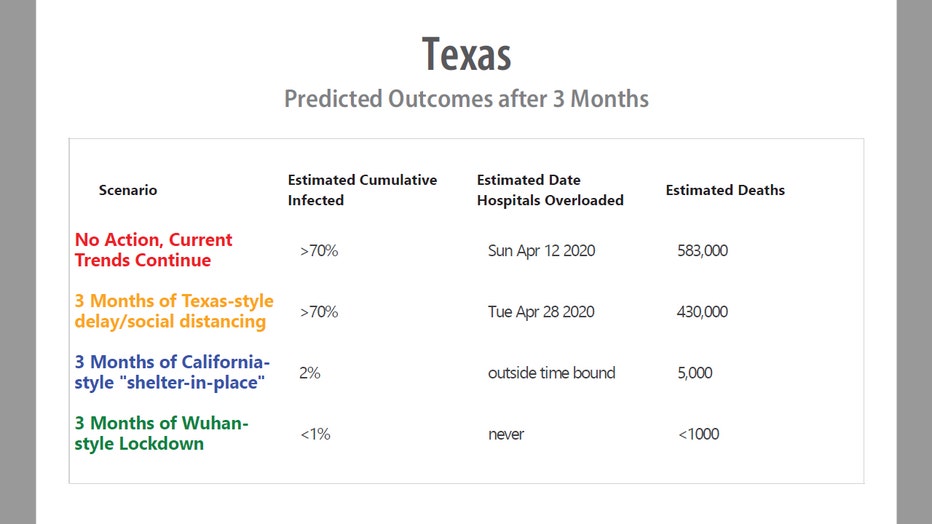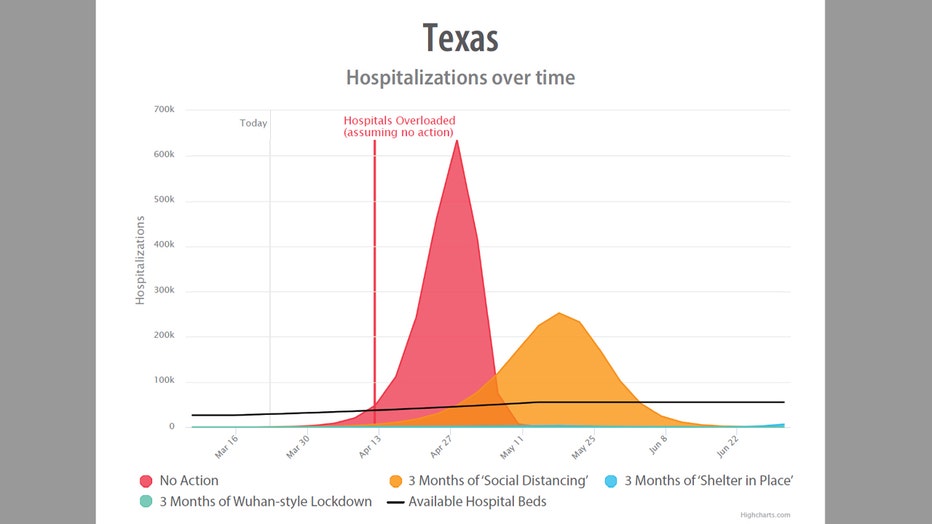Shelter-at-home order issued for Dallas County's residents and workers

Shelter-at-home order issued for Dallas County’s residents and workers
A shelter-at-home order goes into effect at 11:59 p.m. Monday in Dallas County in an effort to try to contain and stop the spread of the coronavirus.
DALLAS - A shelter-at-home order goes into effect at 11:59 p.m. Monday in Dallas County in an effort to try to contain and stop the spread of the coronavirus.
The order applies to anyone who lives or works in the county and lasts until at least April 3.
Dallas County Judge Clay Jenkins said the stay-at-home order is needed to flatten the curve. The goal is to help prevent a scenario in which the number of coronavirus cases exceeds local hospital capacity and to minimize the catastrophic outcomes other countries are seeing because they waited too long.
"This order is our best chance to flatten the curve in Dallas County and save as many lives as possible," Jenkins said. "I know there will be economic hardship and business closures with this order, and it makes me sick we are at this point."
RELATED: Coronavirus coverage
Judge Jenkins says the shelter at home order will be in place until medical professionals in the county recommend it should end.
Dr. Mark Casonova is president of the Dallas County Medical Society. He represents nearly 8,5000 doctors. He gave a clear description of what the county is facing when it comes to fighting the coronavirus and dealing with community spread.
“Right now, we are waging battle with sticks, at best. And we need swords. Our public officials, by making very difficult decisions, provide the armor and shield we need,” he said. “The analogy I would use is dominos are falling behind us. I am hearing them over our left shoulder. About two dominos back. If we can stay at home and stay safe, we can remove, one, God willing, two dominos and effectively provide us the protection we need to handle on a population basis and care for those critically ill as we speak.”
Dr. Phil Huang is the head of Dallas County Health and Human Services. He gave two conservative estimates when it comes to coronavirus spread in the county.
From the 2.5 million residents in Dallas County, if two percent of residents got the coronavirus, that would reflect 51,731 people. The projection also shows 681 people would possibly die from the virus.
Huang says this is an estimate under a shelter-at-home scenario. He says if the infection spread stays low, Dallas County hospitals will have enough beds.
“If we get it down to two percent prevalence in Dallas County, our hospital systems and the number of beds can have it,” Huang said. “If 40 percent of the population gets infected, what the data shows, its conservative, seven percent would be hospitalized. That’s a huge gap, and that is what we are trying to protect.”
Dr. Huang says seven percent hospitalized in that scenario is 75,000 people.
Judge Jenkins says at the end of the day, he knows the financial impacts this decision will have. He is asking all workers if they can work from home to do it. If you can create social distancing, do it everywhere you go to flatten the curve.
“I am at peace with the fact that this is not time for politicians and elected officials to come to consensus on their own,” he said. “It’s a time for us to listen to scientist, on the federal level and the local doctors, when we get that data it’s time for us to act swiftly.”
County officials shared a table and graph that estimates the number of deaths and the date when hospitals become overloaded at certain instances.
It compares four scenarios: the estimated numbers if no action is taken, if there is a "Texas-style delay/social distancing" for three months, if there is a "California-style 'shelter-in-place'" for three months, and if there is a "Wuhan-style lockdown" for three months.


The examples show the flattening the curve model that health officials are trying to achieve with the COVID-19 pandemic.
"We are still working through the language of the county’s quickly evolving orders and discussing the best ways to enforce these orders citywide, but I support a stay-at-home approach to slow the spread of COVID-19. While this approach likely means our city will experience economic difficulties, our top priority is public health, and it’s vitally important that we take the steps necessary to save lives and prevent strain on our healthcare system,” Dallas Mayor Eric Johnson said in a statement.

Dallas County residents ordered to shelter at home
Dallas County issued a shelter in place order that goes into effect Monday night. It's similar to orders issued by several states.
Under the new order, Dallas County residents should only leave home for essential activities like a doctor’s appointment or going to the grocery store.
Everyone is encouraged to work from home if possible. Only essential employees are exempt including those who work in health care, public works, banks and public transportation.
“We are the largest metro area in Texas. We have the largest number of cases in Texas. We have the largest amount of community-spread in Texas. We have the largest amount of uninsured people of any metro in the United States. A quarter of a million people in Dallas County work for a living but can’t afford health insurance and don’t have that afforded to them by the state of Texas like they do in California, Oregon and New York because Texas did not take their share of the money from the Medicaid expansion. So those folks are not going to the doctor,” Jenkins said.
The order is punishable by a fine or jail time.
Judge Jenkins emphasized it applies to anyone living in Dallas County, even if they work in another county.
What's Considered Essential?
The order states, "all individuals currently living within Dallas County are ordered to shelter at their place of residence," unless doing an "essential activity" (going to the grocery store or getting other necessary supplies, exercising while complying with social distancing, going to work, or caring for another family member or pet).
"All businesses operating within Dallas County, except Essential Businesses...are required to cease all activities at facilities located within the county," the order added. All essential businesses must also comply with social distancing "to the greatest extent possible."
The county defined essential businesses as: Essential Healthcare Operations (hospitals, dentists, pharmacies, etc.), Essential Government Functions (services provided by local governments), Essential Critical Infrastructure (operations from the 16 critical infrastructure sectors as identified by the National Cybersecurity and Infrastructure Agency), Essential Retail (grocery stores, warehouse stores, liquor stores, gas stations, businesses that supply products for people to work from home, etc.), businesses that provide food, shelter, and social services for the economically disadvantaged, Essential Services Necessary to Maintain Essential Operations (trash and recycling collection, processing, and disposal, funeral homes, plumbers, etc.), News Media, and Childcare Services.
"Public works construction, residential and commercial construction, airport operations, water, sewer, gas, electrical, oil refining, roads and highways, public transportation, solid waste collection and removal, internet, and telecommunications systems - including the provision of essential global, national, and local infrastructure for computing services, business infrastructure, communications, and web-based services - financial institutions, defense and national security-related operations, essential manufacturing operations provided that they carry out those services or that work in compliance with social distancing requirements," Jenkins explained.
Worship services have also been limited to video or teleconferencing. Churches must also limit their staff to 10 people or less on-site when conducting their services.
DART will continue to run.
Read the full order below for a full list of essential businesses:
Coronavirus Health Tips
While COVID-19 is a new respiratory virus, daily precautions recommended to prevent respiratory illnesses are the same:
• Wash hands frequently with soap and water for at least 20 seconds. Use hand sanitizer when you can't wash your hands.
• Avoid touching your eyes, nose, and mouth.
• Cover your coughs and sneezes with a tissue and throw the tissue away. If you don’t have a tissue, use the elbow of your sleeve. Don’t use your hands to cover coughs and sneezes.
RELATED: Coronavirus FAQ: Here’s what you need to know about the COVID-19 outbreak
• Avoid close contact with people who are sick.
• Stay home when you are sick and keep children home when they are sick.
• Clean and disinfect frequently touched objects and surfaces.
• Get a flu shot. (Although the flu shot does not protect against COVID-19, it is flu season.)
RELATED LINKS:
Track Texas coronavirus cases by county with this interactive map
Tarrant County extends disaster declaration, announces new restrictions
Denton County issues new COVID-19 restrictions
DFW Hospital Council says North Texas hospitals at a critical point in stopping spread of COVID-19
Dallas opens its 2nd COVID-19 test site; has locations near AAC, Ellis Davis Field House

